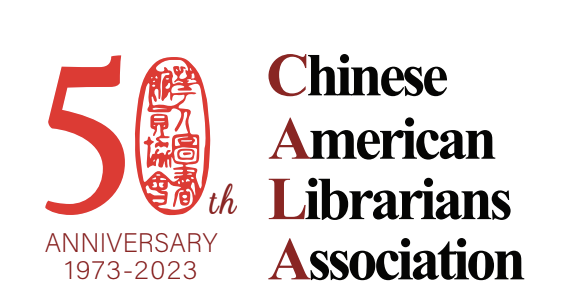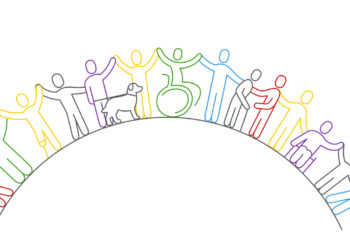Editor’s Note: Today’s post is by Raymond Pun, the academic/research librarian at the Alder Graduate School of Education, Sai Deng, the metadata librarian at University of Central Florida, and Guoying (Grace) Liu, the systems librarian at Windsor University. All authors are members of the Chinese American Librarians Association (CALA). In this guest post, the authors explore the opportunities and challenges in supporting open access initiatives from a library association’s perspective.
Background
 The Chinese American Librarians Association (CALA) is one of several National Associations of Librarians of Color based in the USA – others include the American Indian Library Association (AILA), Asian Pacific American Librarians Association (APALA), Black Caucus of the American Library Association (BCALA), and REFORMA: The National Association to Promote Library & Information Services to Latinos and the Spanish Speaking. The collective membership of these groups are all deeply invested in promoting the values of equity, diversity, and inclusion in the profession in various ways, both independently and collaboratively through initiatives such as the Joint Council of Librarians of Color (JCLC, Inc).
The Chinese American Librarians Association (CALA) is one of several National Associations of Librarians of Color based in the USA – others include the American Indian Library Association (AILA), Asian Pacific American Librarians Association (APALA), Black Caucus of the American Library Association (BCALA), and REFORMA: The National Association to Promote Library & Information Services to Latinos and the Spanish Speaking. The collective membership of these groups are all deeply invested in promoting the values of equity, diversity, and inclusion in the profession in various ways, both independently and collaboratively through initiatives such as the Joint Council of Librarians of Color (JCLC, Inc).
In CALA’s case, we have been supporting the Chinese diasporic community of library workers since 1973. CALA has grown from a local group in the Midwest and now into a global association with over 500 members based in the United States, Canada, and Asia and Pacific regions. CALA’s mission is to:
- Support professional development and research scholarship of CALA members
- Advocate for Chinese American librarians in professional organizations
- Enhance the leadership development of Chinese American librarians through training, mentoring, networking, and collaboration with colleagues in the United States and abroad
- Inspire Chinese American librarians to meet their professional goals and to make valuable contributions to the global library community
Our core organizational values include professionalism; advocacy; collaborative leadership; positive, open, and inclusive environments; accountability, transparency and integrity; service to members; continuous learning; and global perspectives. We recognize that our global members may also identify as researchers and educators whether they are in tenure track positions and/or engaged in the LIS scholarship. In our efforts to uplift scholarly opportunities for our members, our offerings include research grants and awards, webinar presentations, virtual/in-person chapter conferences, poster presentations at the American Library Association Annual Conference, publishing opportunities in the CALA Newsletter (ISSN: 0736-8887) and in the International Journal of Librarianship (IJoL) (ISSN: 2474-3542); and depositing and disseminating research in the CALASYS – CALA Academic Resource & Repository System.

Challenges in pursuing diversity and equity
At CALA and likely in other National Associations of Librarians of Color, there has been increasing membership interest in promoting diversity and equity within research and scholarship. CALA is working to meet this need in a range of ways. IJoL, the CALA’s open access academic journal, provides a venue for Chinese American librarians to publish their own academic work and to lead or contribute to the scholarly discussion on special topics in the library profession. The journal does not charge publication fees, which helps to support CALA members and larger communities. Through additional guidance on academic journal article writing and English language support to CALA members and other Chinese librarians, IJoL has added more voices from under-represented groups, cultures, and regions in scholarly publication.
However, achieving this goal is not without its challenges; of high concern among them is the challenge of advocating for diversity, equity, and inclusion within scholarly communications when your own institution isn’t “there” yet. To elaborate, library associations are often run by volunteers who are students and/or employed by institutions. Each of those institutions, along with CALA itself, is at a different stage in delivering on its vision of diversity, equity and inclusion. This affects individual members’ capacity to advocate at a CALA level when they may still be heavily invested in tackling issues at a local level.
Some of the challenges we have identified are:

Visible and invisible labor
Preserving CALA’s history and documents, advocating for the community for professional development, curating and preserving Chinese studies and Chinese cultural heritage materials are all important to our members, who are mostly Chinese American librarians. Our publishing platforms and channels are led by volunteer leaders within CALA. We recognize that there is immense visible and invisible labor involved in coordinating these activities, especially as a volunteer run organization.
Open access still has costs
For a professional association/society managing OA initiatives, it’s important to take note and stock on how each scholarly output may vary and overlap in terms of commitment, time, expertise, and labor. Our values guide us to facilitate open access, but while resources may be “open access” to publish, preserve, and to disseminate, there are fees to consider when supporting these initiatives. Our journal incurs the usual costs associated with web hosting, submission workflows, peer review, production, DOI assignment, reference linking and similarity checking.
In terms of equity, diversity and inclusion, the challenge is in relation to people’s capacity to serve as editors-in-chief, on the advisory board and as peer reviewers, layout/copyeditors. The time commitment in serving these roles can add up. Members need to learn to communicate via new systems and be trained to serve in specific roles. All the training and documentation has been developed and managed by members who are vested in this OA journal and in CALA. There are challenges in managing the different parts involved in the creation of a new issue every time. The need to commit this much time and to have this level of skill may in itself be excluding.

Repository inclusivity
In 2013, CALA set up the CALASYS repository to collect, organize, and centrally store academic publications, CALA’s documents, CALA and its chapters’ conference and other archival materials, Chinese studies and related information resources, created and contributed by Chinese American librarians, especially CALA members.
To make an institutional repository sustainable, it needs to be more inclusive and open to all of its members. This requires self-submission from the CALA officers and members which has not been an easy task. Another challenge is that most members have their own institutional repositories, and they don’t see the need to have their scholarship deposited into CALASYS. A third challenge is training contributors as well as new CALASYS subcommittee members. Recruiting, onboarding, and training CALASYS subcommittee members (appointed by the CALA President each year) can require effort and a lot of dedication since the work can be technical and time-consuming.
CALASYS offers self-submission and mediated submission including batch import of data, which requires various levels of time and effort commitment from its contributors and CALASYS committee members. The roles on this subcommittee are one year long (July-June) and can be re-appointed. One main challenge is that there needs to be training and support, and usage of the repository to be effective. CALASYS is the only repository that focuses on the Chinese American librarians’ scholarly and life experiences. This would be impactful in sharing out CALA members’ contributions in a field that is not very diverse, and to celebrate and recognize such contributions all year around especially during Asian American and Pacific Islander Heritage Month in the United States and Asian Heritage Month in Canada.
In general, it can become potentially difficult in identifying members willing to serve on these tasks because of the amount of time and labor involved. It can be a year turn over and challenging to sustain this work when there are new members to onboard and train. Some appointments can vary from 1-3 years long, we recommend longer term and staggering commitment appointments for these types of work if possible.
One of the very important aspects for repository inclusivity is content inclusiveness. Currently CALASYS collects and preserves the organization’s archival materials, its chapter collections, its members’scholarly achievements, as well as Chinese cultural heritage & Chinese studies collections. To promote self-contribution and collection development, CALA created the CALA 50th Anniversary and CALASYS Collection Grant in 2022 which helped in building three new collections. The grant recipients also developed a series of webinars related to Chinese American authors, Chinese rare books and cultural heritage collections which have reached a large audience. CALA needs to continue to promote these platforms and channels and explore new ways to develop content, and make known their impact so that our members will be interested in contributing to them.

Building Experiences and Opportunities
The major opportunity for these scholarly and/or archival outputs is that CALA is an academic focused organization. Its membership has always been expanding and new scholarly and related works have always been emerging. New members seek publishing, serving as well as professional development opportunities. The membership does include non-academic library workers/LIS educators. We do have school, public, archival, and special library workers volunteering for other committee assignments. These opportunities strengthen CALA’s and its members’ efforts in supporting equity, diversity, and inclusion in research, especially for an association that has been around for 50 years. In addition, there’s an opportunity for the future to emphasize and promote multilingual content; CALASYS accepts Chinese materials since some of the records’ metadata has Chinese language too. CALA has gained more support from the community in recent years (including revenues from job postings), which gives the organization more opportunity to create grants for best collections and best papers.
Inequalities of volunteer-led organizations
Overall, It comes down to the library association’s volunteer capacity, membership interest, and how the values and operating principles of the association carries these initiatives to fruition consistently. One main opportunity is that members who have served on such committees have been able to develop expertise and technical skills in understanding scholarly/open access publishing, repository management work, and training skills. Members who engage in such activities may align this work with their own professional work or as students to develop keen interest in scholarly publishing. This can enhance their own work and job prospects.
We acknowledge that there is a great deal of unpaid visible and invisible labor and the crux of this issue is that a volunteer-led organization has no paid staff to manage these efforts consistently. Ideally it is possible that in the future, these roles can include varying stipends from peer reviewers to editors in chief to repository managers. All labor has dignity. Societies/associations, especially library related ones, interested in OA initiatives may want to consider and plan for these challenges and opportunities carefully.
We look forward to hearing from readers on your experiences volunteering or working in societies/associations promoting open access initiatives and the opportunities and challenges in doing so. Reach out to us at exc@cala-web.org.
Note: We want to recognize and thank the CALASYS Subcommittee Members: Suzhen Chen, Weiling Liu, XIaoli Ma, and the IJoL co-editors-in-chief Xiaoai Ren and Yongming Wang for providing input on this piece during the draft stage.



